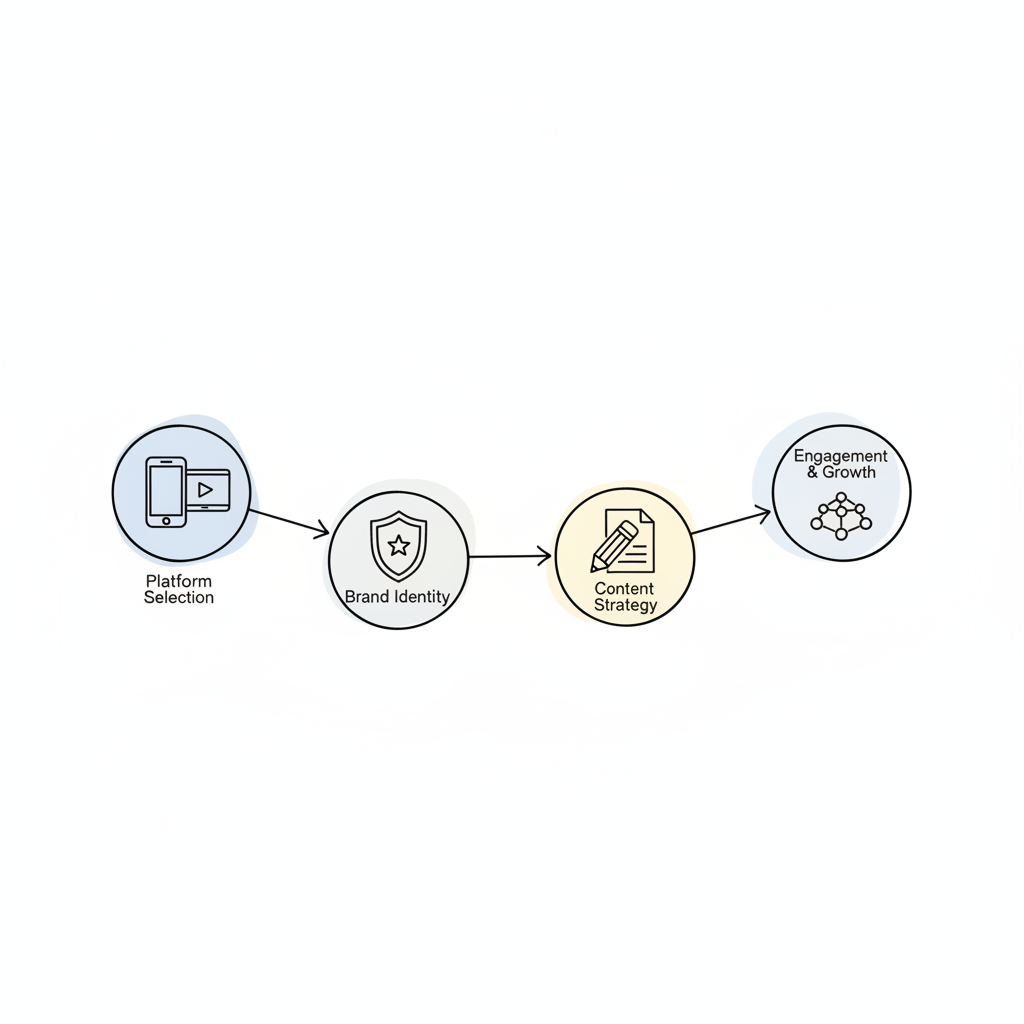In today's digital age, social media marketing has become an indispensable tool for startups. With its potential to reach a vast audience and build brand awareness, it is no wonder that businesses are leveraging social media to gain a competitive edge. However, understanding the power of social media marketing and its role in the business world is crucial for startups. In this article, we will explore the importance of social media marketing for startups and delve into key strategies that every startup should know.
In today's hyper-connected world, social media has transformed the way businesses operate. It has become an essential tool for customer engagement, brand building, and driving sales. With billions of active users across various platforms, social media offers a unique opportunity for startups to connect with their target audience at a global scale.
Social media platforms such as Facebook, Instagram, Twitter, and LinkedIn have revolutionized the way businesses communicate with their customers. These platforms provide a space for businesses to share updates, promotions, and valuable content with their followers. By leveraging the power of social media, businesses can reach a wider audience and establish a strong online presence.
One of the key advantages of social media marketing is its cost-effectiveness. Unlike traditional marketing channels, such as television or print advertisements, social media allows startups to reach a large number of potential customers at a fraction of the cost. This is especially beneficial for startups with limited marketing budgets, as they can allocate their resources more efficiently.
Startups, in particular, can greatly benefit from incorporating social media marketing into their overall strategy. Unlike traditional marketing channels, social media is cost-effective and offers a level playing field for startups to compete against established brands. It allows startups to target specific demographics, gather valuable insights, and engage directly with their customers, thereby fostering brand loyalty and driving growth.
When it comes to targeting specific demographics, social media platforms provide startups with advanced targeting options. Startups can define their target audience based on factors such as age, location, interests, and behavior. This level of precision ensures that startups are reaching the right people with their marketing messages, increasing the chances of conversion and customer acquisition.
In addition to targeting, social media also allows startups to gather valuable insights about their customers. Through analytics tools provided by social media platforms, startups can track the performance of their marketing campaigns, measure engagement levels, and understand customer behavior. These insights can then be used to refine marketing strategies and optimize future campaigns.
Furthermore, social media enables startups to engage directly with their customers. By responding to comments, messages, and reviews, startups can establish a personal connection with their audience. This not only helps in building brand loyalty but also provides an opportunity for startups to address customer concerns and improve their products or services based on customer feedback.
In conclusion, social media marketing has become an indispensable tool for startups in today's business landscape. Its cost-effectiveness, advanced targeting options, ability to gather insights, and direct customer engagement make it a powerful strategy for startups to drive growth and establish a strong brand presence. By harnessing the power of social media, startups can level the playing field and compete with established brands, ultimately leading to long-term success.

Building a strong social media presence is crucial for startups looking to establish their brand and connect with their target audience. With the ever-growing popularity of social media platforms, it's essential for startups to navigate the digital landscape strategically. By leveraging the power of social media marketing, startups can create brand awareness, drive traffic to their website, and ultimately boost their business growth.
When it comes to social media marketing, not all platforms are created equal. Startups need to carefully evaluate their target audience and business objectives to determine which platforms are most suitable for their brand. Each social media platform has its own unique characteristics and audience demographics, making it essential to select the right ones to maximize reach and engagement.
For example, Facebook is a popular platform with a wide user base, making it ideal for startups targeting a broad audience. Instagram, on the other hand, is known for its visual appeal and is perfect for startups in the fashion, beauty, or lifestyle industries. Twitter, with its real-time updates and trending topics, is great for startups looking to engage in conversations and stay connected with their audience. LinkedIn, with its professional networking focus, is ideal for B2B startups looking to establish industry connections and share thought leadership content.
A cohesive brand image is essential for startups to establish credibility and build recognition. Consistency in brand tone, visuals, and messaging across different social media platforms helps create a unified brand identity. Startups should develop a brand style guide and ensure that their social media content aligns with their overall brand strategy.
By maintaining a consistent brand image, startups can cultivate trust among their followers and build a recognizable and memorable brand. When users see consistent branding across platforms, they are more likely to perceive the startup as professional and reliable. This consistency also helps in creating a seamless user experience, as followers can easily identify the startup's content regardless of the platform they are using.
Moreover, a consistent brand image helps startups differentiate themselves from their competitors. By establishing a unique and recognizable visual identity, startups can stand out in a crowded social media landscape. This distinctiveness can attract and retain followers, ultimately leading to increased brand loyalty and customer engagement.
In conclusion, building a strong social media presence requires careful consideration of the right platforms and the creation of a consistent brand image. By strategically utilizing social media marketing, startups can effectively connect with their target audience, establish their brand, and drive business growth.
Content creation and curation play a vital role in the success of startups in today's digital age. With the ever-increasing competition and the constant bombardment of information on social media platforms, it is crucial for startups to invest in high-quality content that captures and retains audience attention.
High-quality content serves as the foundation for building a strong online presence. It not only helps startups establish credibility and trust with their target audience but also sets them apart from their competitors. By creating content that is informative, entertaining, and valuable, startups can effectively engage their audience and leave a lasting impression.
Whether it's through blog articles, videos, infographics, or interactive posts, compelling content has the power to generate engagement and encourage users to share it with their networks. This organic sharing not only increases brand visibility but also expands the reach of the startup's message, ultimately leading to increased brand awareness and potential customer acquisition.
While creating high-quality content is essential, it is equally important for startups to curate their content to suit the specific platforms they are using. Different social media platforms have different content requirements and user expectations, and startups need to adapt their content strategy accordingly.
For example, Instagram, being a visually-driven platform, emphasizes the importance of visually appealing content. Startups need to focus on creating eye-catching images or videos that resonate with their target audience and align with their brand identity. By leveraging the power of visual storytelling, startups can effectively capture the attention of Instagram users and create a strong visual presence.
On the other hand, Twitter thrives on concise and impactful messages due to its character limit. Startups must craft their content in a way that delivers their message effectively within the limited space available. This requires careful consideration of words, hashtags, and even emojis to make the content stand out and engage Twitter users in a meaningful way.
By understanding the nuances of each platform and adapting their content strategy accordingly, startups can optimize their engagement and achieve better results. This strategic approach to content curation not only helps startups connect with their target audience on a deeper level but also allows them to build a strong and loyal community around their brand.
In conclusion, content creation and curation are essential components of a successful startup's digital marketing strategy. By investing in high-quality content and tailoring it to suit different social media platforms, startups can effectively engage their audience, increase brand visibility, and ultimately drive business growth.
Engaging with the audience is essential for startups looking to foster meaningful connections and build brand loyalty. Social listening, the process of monitoring and analyzing conversations happening on social media platforms, allows startups to gain insights into their customers' needs, opinions, and concerns. By actively listening and responding to these conversations, startups can demonstrate their commitment to customer satisfaction and strengthen their relationships with their audience.
Every interaction on social media is an opportunity for startups to showcase their dedication to customer satisfaction. Whether it's responding to comments, messages, or reviews, timely and personalized communication is key. Startups should adopt a proactive approach in addressing customer queries, resolving issues, and showing gratitude for positive feedback. By engaging with their audience in a genuine and helpful manner, startups can build a loyal community of brand advocates.

In addition to organic reach, startups can leverage social media advertising to further expand their audience reach and drive targeted traffic. Social media platforms offer various ad formats, including image ads, video ads, carousel ads, and sponsored content. Startups should understand the unique capabilities and audience targeting options of each ad format to create compelling advertisements that resonate with their target audience.
One of the greatest advantages of social media advertising is its ability to precisely target specific demographics and interests. Startups can use advanced targeting features to reach their ideal customers based on factors such as age, location, interests, and browsing behavior. Additionally, retargeting allows startups to re-engage users who have previously interacted with their brand. By strategically deploying targeting and retargeting strategies, startups can optimize their advertising budget and drive conversions.
In conclusion, social media marketing offers startups a world of opportunities to establish their brand, engage with their audience, and drive business growth. By understanding the power of social media marketing, building a strong social media presence, creating valuable content, engaging with their audience, and utilizing social media advertising effectively, startups can unlock the full potential of this powerful marketing tool. Embracing these tactics will set startups on the path to success in the dynamic and ever-evolving digital landscape.
By submitting this form, you agree to our Privacy Policy and Terms & Conditions.